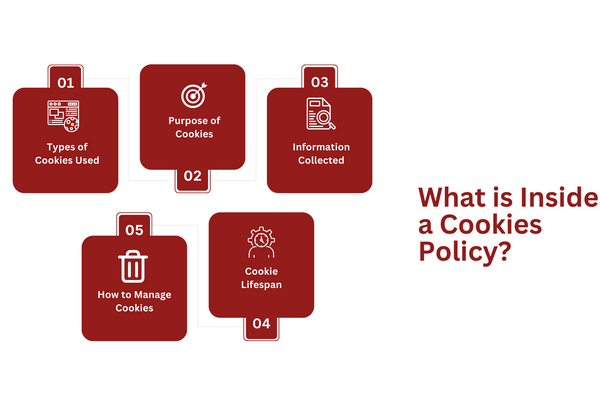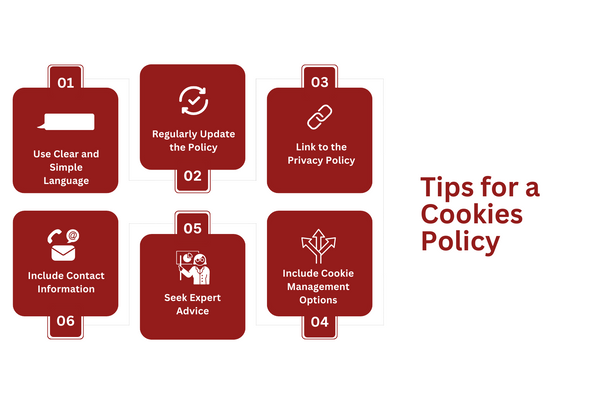
In the digital landscape, a cookies policy is no longer a mere compliance tick box for businesses but a crucial aspect of data transparency that consumers value.
This article is designed to examine cookie policies, their relevance, and how they impact consumers and businesses.
We will dissect various topics, from understanding what a cookie policy entails to exploring samples and templates that can guide you in crafting your own. Moreover, we’ll delve into GDPR principles, advertising aspects, data privacy, and analytics.
Let’s dive in.
Key Takeaways
A detailed and transparent approach to cookies is essential for fostering consumer trust, complying with legal requirements, and extracting insightful business data.
The key components of a cookies policy include the types of cookies used, the purpose of cookies, information collected, cookie lifespan, and guidance on cookie management.
Successful cookies policies, as exemplified by businesses like Google, BBC, and Shopify, strike a balance between legal requirements and user-friendly communication.
What is a Cookies Policy & How Does it Work?
What is a Cookies Policy & How Does it Work.png

A cookies policy is a legal document provided on a website to inform consumers about the use of cookies by the site. In the digital sense, cookies are small text files stored on a consumer’s device when they visit a site.
They allow the website to remember information about the visit, such as consumer preferences, to improve the consumer experience on subsequent visits.
Any business that owns a website and uses cookies, especially those involved in collecting personal data, needs a cookies policy.
This is crucial not only for corporate compliance but also for ethical and legal reasons. The cookies policy must be easily accessible on the site, with clear explanations of the types of cookies used, their purpose, and the kind of data they collect.
Why is a Cookies Policy Important
A cookies policy serves a crucial role in today’s digital ecosystem. Its importance stems from a variety of factors that are not only integral to a business’s operational functionality but also fundamental to preserving and respecting the rights of consumers. Here are some reasons why they’re important:
Transparency and Trust
A transparent and comprehensive cookies policy builds trust with consumers. It demonstrates that the business is committed to maintaining an open and honest relationship with its consumers.
By disclosing how and why cookies are used, a business can set the right expectations, thereby preventing misunderstandings and potential breaches of trust.
Legal Compliance
Implementing a cookies policy is a legal requirement in many jurisdictions, especially in light of data protection laws such as the General Data Protection Regulation (GDPR).
Non-compliance can result in hefty fines, penalties, and damage to reputation. Businesses often outsource compliance to data protection compliance services to ensure that they meet all the necessary requirements.
Consumer Control
Cookies policies give consumers control over their personal information. By understanding what cookies are used for, consumers can make informed decisions about their data and how it’s used. Consumers have the right to give or withhold cookie consent, which can be exercised through their browser settings.
Business Insights
For businesses, a cookies policy is the gateway to valuable analytics that can improve services and product offerings.
By transparently using cookies, businesses can collect information about consumer behavior, preferences, and patterns. This data, when used responsibly, can be a game-changer in developing strategies and optimizing the consumer experience.
What is Inside a Cookies Policy?
What is Inside a Cookies Policy.png

Understanding the components of a cookies policy is crucial for both consumers and businesses.
This document, often found on the cookies policy page of a website, serves as a comprehensive guide to how cookies operate within that particular site. Let’s dissect what is typically included in a standard cookies policy:
Types of Cookies Used
A cookies policy should explicitly list the types of cookies used by the website. This can include first-party cookies, which are created by the website itself, and third-party cookies, which are generated by external services or providers, such as advertising networks.
Purpose of Cookies
Each cookie serves a particular purpose. Some cookies are necessary for the website’s functionality, while others enhance the consumer experience by remembering preferences and login details. Then, there are cookies used for analytics and advertising purposes. The policy should detail each cookie’s purpose.
Information Collected
The policy must clearly state what information is being collected through cookies. This could range from IP addresses and browser types to specific consumer activities on the site. For businesses, this is an area where transparency is key to ensuring consumer trust.
Cookie Lifespan
Another critical aspect to include in a cookies policy is the lifespan of each cookie. Some cookies are session cookies, which are temporary and expire once the browser is closed, while others are persistent cookies that stay on the consumer’s device until a set expiry date.
How to Manage Cookies
Lastly, a cookies policy should guide consumers on how to manage cookies. This includes instructions on how to disable or delete cookies through browser settings. It is a vital aspect of providing control to consumers over their data.
Tips for a Cookies Policy
Tips for a Cookies Policy.png

Creating an effective cookie policy is a thoughtful process that requires precision, clarity, and adherence to data protection norms.
Whether you’re using a cookie policy template or drafting one from scratch, these tips can guide you in establishing a standard cookies policy that adheres to best practices and regulations:
Use Clear and Simple Language
While a cookies policy is a legal document, it doesn’t mean it has to be filled with jargon. Using clear, simple language will help consumers understand how their data is collected and used. Avoiding technical terms can significantly enhance the readability and comprehension of the policy.
Regularly Update the Policy
As your website evolves, so should your cookies policy. Regular updates are necessary, especially when there are changes in the types of cookies used, the data collected, or the purpose of data collection. It ensures that the policy reflects the current practices of the website accurately.
Link to the Privacy Policy
A cookies policy is often a part of the broader privacy policy of a website. However, it’s good practice to have a separate, easily accessible cookies policy and link it to the privacy policy. This provides a comprehensive view of all data-related practices in one place.
Include Cookie Management Options
Empower consumers by providing clear instructions on how they can manage cookies on their devices. This could include steps to disable or delete cookies. It’s a way of emphasizing that consumers have control over their data.
Seek Expert Advice
While a free cookie policy template can be a good starting point, it’s advisable to seek expert advice for customization according to your website’s specific needs. Compliance consultants or data protection compliance services can offer valuable insights and ensure that your policy aligns with all relevant laws and regulations.
Include Contact Information
Should consumers have any queries or concerns about your cookies policy, they should know where to turn. Including contact information or a designated point of contact gives consumers reassurance that their concerns will be addressed.
By adhering to these guidelines, businesses can ensure they are in line with data compliance requirements, ultimately upholding GDPR principles, fostering consumer trust, and ensuring corporate compliance.
Examples of a Good Cookies Policy
When it comes to creating a robust cookies policy, businesses can benefit from studying successful examples. These examples can serve as an informative cookie policy template, showcasing best practices in clarity, structure, and compliance. Let’s look at some examples of well-crafted cookies policies and understand why they are effective.
Google’s cookies policy stands out for its clarity and comprehensiveness. It uses simple language to explain what cookies are, how they’re used, and the types of cookies utilized by Google services. Moreover, Google provides links to additional resources where consumers can learn about cookie management and privacy settings.
The strength of Google’s policy lies in its depth and transparency. It provides details about each type of cookie, the purpose it serves, and even the duration the cookie stays on the consumer’s device. This level of detail ensures consumers are fully informed and can make conscious decisions about their data.
BBC
BBC’s cookies policy is an excellent example of a user-friendly and accessible document. It offers a categorized breakdown of the different cookies they use, including ‘Strictly necessary’ cookies, ‘Performance’ cookies, ‘Functionality’ cookies, and ‘Targeting’ cookies. Each category comes with a clear explanation of its purpose.
One unique feature of the BBC’s policy is the ‘Cookie settings’ option. This provides consumers with a direct mechanism to manage their cookie preferences, which emphasizes consumer control over their data.
Shopify
Shopify’s cookies policy effectively demonstrates how a business can balance legal requirements with clear communication. It lists the cookies used, divided by purpose, and offers a brief description of each. It also provides the expiry date of each cookie, which adds another layer of transparency.
What’s more, Shopify’s policy links back to its main privacy policy, creating a comprehensive data protection framework for consumers to refer to. It also specifies the policy’s last update, informing consumers that the document is actively maintained.
Amazon
Amazon’s cookies policy is a strong example of an effective, comprehensive approach to consumer data.
The policy begins with a concise explanation of what cookies are and how Amazon uses them, followed by a detailed list of the different types of cookies in use, including first-party cookies, third-party cookies, and web beacons.
Each type of cookie has a brief description that explains its purpose and function. This helps consumers understand why Amazon needs these cookies and how they enhance the overall consumer experience.
Amazon’s policy also includes a detailed guide on how consumers can manage their cookies and opt out of certain types. This part of the policy emphasizes consumer control and reflects the business’s commitment to consumer choice and privacy.
Closing
Having gained a comprehensive understanding of a cookies policy, the next step for businesses is to evaluate or establish their own policy.
An effective cookies policy goes beyond mere compliance – it’s a powerful tool for building trust and facilitating better consumer experiences on your website.
While free cookie policy templates and examples from other businesses provide a good starting point, creating a customized policy that fits your specific needs can often prove more effective. This is where professional assistance can make a significant difference.
Our team at Captain Compliance offers compliance solutions, tailored to your business needs. We understand that navigating the landscape of data privacy can be complex. Our team of experts can guide you through the intricacies of creating a robust, comprehensive, and user-friendly cookies policy.
Whether you’re looking to revamp your existing policy start from scratch, or just some consultation, we are ready to assist. Don’t let the complexities of compliance slow your business down. Contact us today to help you develop a cookies policy that meets legal requirements and enhances trust with your consumers.
FAQs
What are cookies in the digital context?
In the digital sense, cookies are small text files that websites store on a consumer’s device when they visit. They remember information about the visit, such as consumer preferences, and improve the consumer experience during subsequent visits.
For more in-depth information, check out our education page!
Why do websites need a cookies policy?
Websites need a cookies policy to inform consumers about their use of cookies. It’s a legal requirement in many jurisdictions, especially due to data protection laws such as GDPR. A cookies policy builds trust with consumers and allows businesses to gather valuable insights while maintaining legal compliance.
Learn more about the legal aspects of cookies here!
How can I control the use of cookies on a website?
Most websites will offer you an option to manage your cookie preferences. You can also control the use of cookies through your browser settings, where you can disable or delete cookies.
Our detailed guide on How to Manage Cookies provides step-by-step instructions for various browsers.
What are first-party and third-party cookies?
First-party cookies are created by the website itself to remember consumer information, such as login details or items in a shopping cart. Third-party cookies, on the other hand, are generated by external services or providers, such as advertising networks.